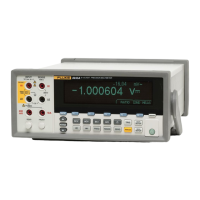Introduction and Specifications
Introduction 1
1-3
Introduction
The 8845A and 8846A are 6-1/2 digit, dual-display multimeters designed for bench-top,
field service, and system applications. Their full complement of measurement functions
plus its RS-232, IEEE 488, and Ethernet Remote Interfaces makes these multimeters
ideal candidates for precision manual measurements and use in automated systems. For
portability, these multimeters include a carrying handle that also serves as a bail for
bench top operation.
There are a few additional features in the 8846A that are not present in the 8845A. These
features will be identified with the annotation of “8846A Only” by each feature that is
found only in that model. Separate specification tables are also used to clarify the
differences between these two models.
The following is a list of some of the features and functions:
• Bright, large-digit, wide-viewing-angle display
• Dual display for displaying two properties of an input signal (e.g., ac voltage in one
display and frequency in the other).
• Remote operation via IEEE 488, RS-232, and Ethernet interface.
• Trigger in and measurement-complete out
• Front panel USB port for optional memory (8846A Only)
• 6-1/2 digit resolution
• Half-rack width
• True rms ac
• 2 and 4-wire resistance measurements
• Extended 10 Ω and 1 GΩ ranges (8846A Only)
• Frequency measurements to 300 kHz (8846A to 1 MHz)
• Capacitance measurements (8846A Only)
• Temperature measurement (8846A Only)
• 10 A current capability
• Decibels (dB and dBm) with variable reference impedance and audio power
measurement capability
• Input terminals on both front and rear panels of the meter
• Closed-case calibration (no internal calibration adjustments)
This calibration manual focuses on performance verification and calibration of the Fluke
8845A and 8846A Digital Multimeters (hereafter referred to as the Meter).
Safety Information
This section addresses safety considerations and describes symbols that may appear on
the Meter or in the manual.
A Warning statement identifies conditions or practices that could result in injury or
death.
A Caution statement identifies conditions or practices that could result in damage to the
Meter or equipment to which it is connected.

